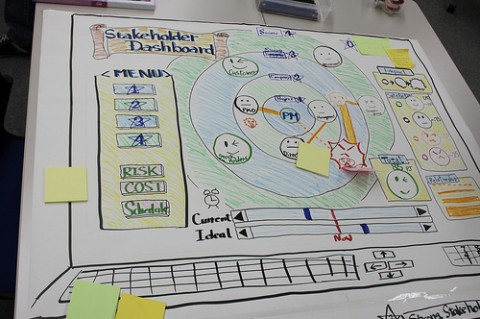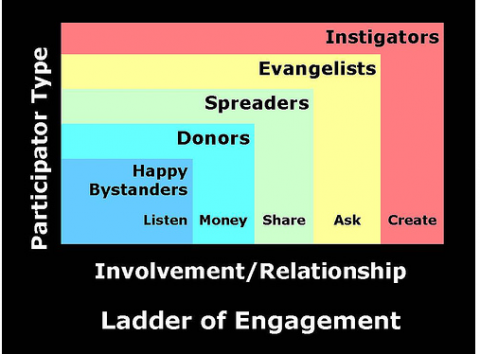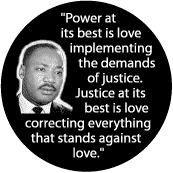Tag Archive: Networks
May 3, 2011
 Photo by: Morningstar3
Photo by: Morningstar3
Osama Bin Laden is back on the headlines. We can find many lessons about networks in our struggle with this man and the ideology of terror that he came to represent. When talking about networks I often refer to The Starfish and the Spider, the excellent book by Brafman and Beckstrom that has now become a sort of Tea Party organizing manual. No matter what we think about Bin Laden, Al-Queda is more of a starfish, an organization that is “headless” while having many legs. On the other hand, the Government of the United States is most definitely a spider, an organization has one head controlling its many legs.
If Bin Laden had been a leader in the traditional sense Read More
April 27, 2011

|Photo by Robert Higgins|http://www.flickr.com/photos/37893534@N07/4779016818|
“Stakeholder” is a big word in our practice at IISC. When it comes to our collaborative change work, we take stakeholder analysis very seriously, in certain situations spending a few days to complete this critical task. The aim is generally to surface the names of those groups and individuals who as a sum total will help to ensure that we have the system represented in the room. What this means is pushing people, at times, into uncomfortable places to consider typically unheard voices and those they have outright resisted inviting to the table but without whom they could not hope to make the kind of change to which they aspire.
Typically we engage in a conversation with our clients and partners that asks them identify, in the context of some given change effort, those whose stakes are defined in the following ways: Read More
March 1, 2011
 Photo by: RandomStar
Photo by: RandomStar
A shared e-mail from Gibran to Curtis
Curtis,
I love thinking about this stuff with you – specially given the privilege that we have in actualizing these innovations through our most exciting client work. We have to look a lot more deeply into what we are each calling a network. As implied in my tweet of the Jeff Stamps quote:
“The evolution is from systems, to complexity to networks – these transcend and include each other.” Read More
February 28, 2011

Photo by: Gany
A shared e-mail from Curtis to Gibran
G,
Was just thinking of you, especially in light of the following tweet, which I really want to discuss with you (and others at IISC if they are interested) – The evolution is from systems, to complexity to networks – these transcend and include each other. Great stuff, and I want to explore this more. I want to understand it better. Read More
February 11, 2011
 Photo by: Carija
Photo by: Carija
The following is a post by Steve Waddell in NetDev….
Last week I presented maps for a Renew Boston (RB) group. Although the maps are preliminary, they provide a good illustration of how the two methodologies used can be complementary. They present a nice case study about use of maps.
Why map? Here’re the reasons I give:
- To “see” the whole “change field”…rather than limited individual perspectives
- To create collective visions and theories of change
- To understand current relationships and how work is currently done
- To understand how relationships/work flows should change
- Define implications of changes to identify key leverage points for optimal influence and conflicts, synergies and gaps
Read More
February 9, 2011

|Photo by Vvillamon|http://www.flickr.com/photos/villamon/4468869725|
In a recent article in Administration and Society, Sonia M. Ospina and Angel Saz-Carranza consider how it is that leadership in multi-organizational networks carries out vital balancing acts. On the one hand, they consider ways to navigate the internal tension between creating unity and honoring diversity among stakeholders. On the other hand, they look at how the balance is struck between confrontation and dialogue when doing outward-facing work. The source of their insights are the experiences of two urban immigration coalitions in the United States.
By way of summary, to successfully address paradox in the context of balancing unity and diversity inside the network, Ospina and Saz-Carranza observed leadership doing the following: Read More
February 2, 2011

|Image from cambodia4kidsorg|http://www.flickr.com/photos/cambodia4kidsorg/2296887265|
I’ve been working with a couple of organizations and initiatives lately as they discuss enhancing their strategies for stakeholder engagement. Throughout all of this work is the emerging awareness that we are in the midst of a paradigm shift in our field with respect to what engagement means and looks like. This, of course, has been captured by many writers and thinkers who have been looking closely at what social media is enabling (see, for example, Clay Shirky’s work, the Working Wikkily blog, or the writings of Beth Kanter and Allison Fine). And at the same time there is a realization that this is not just about technology, but a return to some of what we’ve forgotten as well as a step towards something new. Read More
January 26, 2011

|Photo by tarotastic|http://www.flickr.com/photos/tjt195/30916171|
Last week it was my humble privilege to be part of an august team of network thinkers and consultants as we delivered on our contract of working with community-based organizations that are involved in the pioneering Renew Boston initiative. My teammates included Steve Waddell, Madeleine Taylor, Beth Tener, Tom Cosgrove, Nick Jehlen, Noelle Thurlow, Carl Sussman, and Bruce Hoppe. Our deliverable ultimately emerged in the form of an action learning forum focused on best practices and challenges around enrolling community members in an exciting money-saving program that promotes energy efficiency and renewable energy. As part of the forum, we collectively offered and demonstrated net work tools and strategies for enhancing overall success.
At one point a comment was made by one of the participants about the importance of leadership, which spurred some break-time conversation between a few of us on the consulting team. Truth be told, we never came to full agreement as a consulting team on what we mean by “networks” (I’ve learned that sometimes it’s better to avoid conversations about orthodoxy and instead focus on the practical implications of what is otherwise a shared felt sense or essence) but I think we all agreed that leadership is a tricky concept when applied to new distributed ways of working. Read More
January 26, 2011

|Photo by tarotastic|http://www.flickr.com/photos/tjt195/30916171|
Last week it was my humble privilege to be part of an august team of network thinkers and consultants as we delivered on our contract of working with community-based organizations that are involved in the pioneering Renew Boston initiative. My teammates included Steve Waddell, Madeleine Taylor, Beth Tener, Tom Cosgrove, Nick Jehlen, Noelle Thurlow, Carl Sussman, and Bruce Hoppe. Our deliverable ultimately emerged in the form of an action learning forum focused on best practices and challenges around enrolling community members in an exciting money-saving program that promotes energy efficiency and renewable energy. As part of the forum, we collectively offered and demonstrated net work tools and strategies for enhancing overall success.
At one point a comment was made by one of the participants about the importance of leadership, which spurred some break-time conversation between a few of us on the consulting team. Truth be told, we never came to full agreement as a consulting team on what we mean by “networks” (I’ve learned that sometimes it’s better to avoid conversations about orthodoxy and instead focus on the practical implications of what is otherwise a shared felt sense or essence) but I think we all agreed that leadership is a tricky concept when applied to new distributed ways of working. Read More
January 25, 2011

We at IISC have the privilege of witnessing heartful, sometimes heart wrenching dialogue about critical issues in our world from multiple perspectives. We work with passionate laypeople and professionals focused on education, environment and sustainability, public health, peace and justice, youth development, racial justice, city planning and community development, to name a few disciplines.
I’m encouraged by a few themes that are coming up more and more in our work. And, I’m even more encouraged that increasingly, they are emerging as imperatives, not just “nice ideas.” As we facilitate processes and bear witness to the struggle to bring forth justice, here are some of the voices we’ve heard calling out: Read More
January 13, 2011

Picking up from my post the other day (“Pauses for the Cause”) about the process learnings of our recent IISC retreat, I wanted to focus a bit on the content take-aways. As I previously mentioned, the reason for our coming together as a staff was to revisit and dive into the roots of our collaborative practice: networks, equity/power/inclusion, and “the love that does justice.” It wasn’t long before we were wondering whether these are not more appropriately called the lenses through which we look as we go about our collaborative capacity building and change work. And it did not take long after that for us to question whether the labels we have selected for these lenses are the appropriate ones. I want to spend the rest of this post looking at where our conversation took us with respect to love, in particular.
What’s love got to do with it? That was not exactly our guiding question, but we got there eventually through some of our struggles to reach shared understanding and agreement about what we mean when we say “the love that does justice.” Our facilitator engaged us in writing on stickies short phrases and sentences that explained what it means to integrate this into our practice. The activity yielded a plethora of multi-colored squares that we then organized into themes. Here is what emerged, categorically speaking: Read More
October 1, 2010
Malcolm Gladwell has certainly whipped up something of a firestorm, at least among social media and network enthusiasts. In a sense, his timing couldn’t be better as this very morning IISC staff gathers with some very bright and committed network building thinkers and consultants to take our ongoing conversation about networks for social change the next step, with some practical application in our collective sights. I expect, and hope, that some of the energetic on-line conversation Gladwell has inspired in our community will continue during this in-person gathering.
In case you missed it, the author of The Tipping Point published a piece in the recent New Yorker entitled, “Small Change: Why the Revolution Will Not Be Tweeted.” Read More
 Photo by: Morningstar3
Photo by: Morningstar3
 Photo by:
Photo by: 
 Photo by:
Photo by: 



